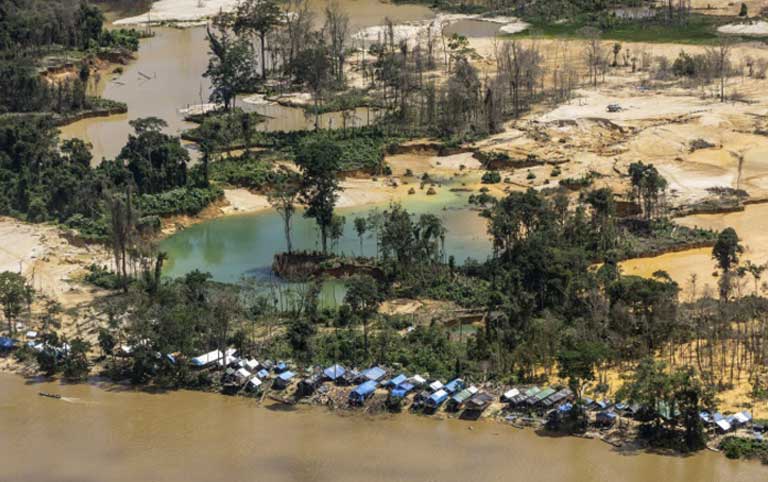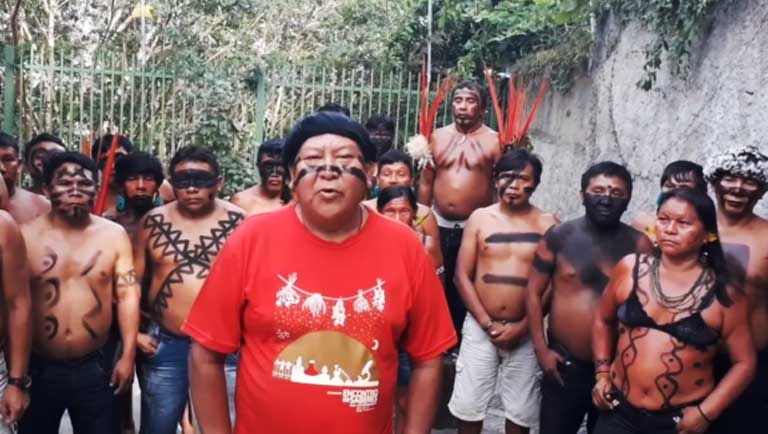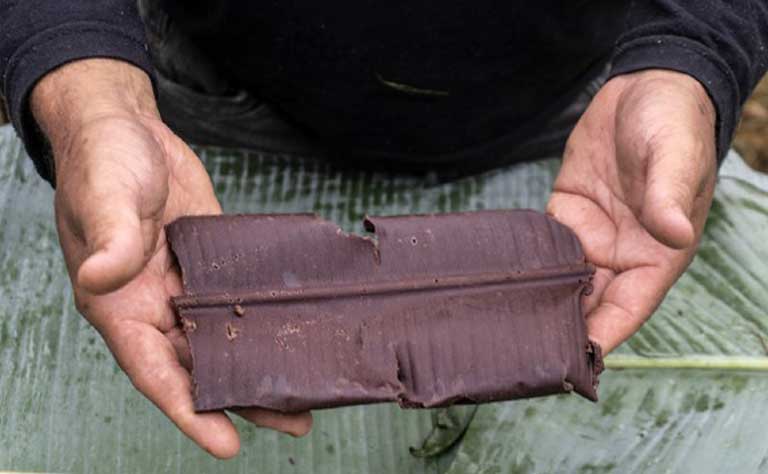
Thousands of goldminers (garimpeiros) have illegally invaded Yanomami Park, one of Brazil’s largest Indigenous territories, officially demarcated by the Brazilian government in 1992, and covering 96,650 square kilometres (37,320 square miles) of rainforest in the states of Roraima and Amazonas, near the border with Venezuela.
An incursion of this scale has not occurred for many years, bringing back memories among Indigenous elders of the terrible period in the late 1980s, when some 40,000 goldminers moved onto their land and about a fifth of the Indigenous population died in just seven years due to violence, malaria, malnutrition, mercury poisoning and other causes.
Davi Kopenawa, a Yanomami leader, estimates that some 20,000 miners are now on Indigenous land. While the public perception of such operations is that they are artisanal or small-scale, they are typically sophisticated operations. The current crop of miners are likely underlings, well-funded and backed by well-to-do entrepreneurs who pay the miners or give them a share of production, while also supplying the workers with leased dredges, earth movers, and other heavy equipment, along with airplanes to fly in supplies and fly out the gold.
The miners are polluting the reserve’s rivers with mercury and silt, eroding the river banks, cutting down forest, scaring away the animals that the Indians hunt, and destroying fisheries, while inciting Indigenous women into prostitution. Both the Mucajaí and Uraricoera rivers have become so polluted that people living in Boa Vista, the capital of Roraima state, located 570 kilometers (354 miles) downstream, have complained about the deteriorating water quality in their river, the Rio Branco, which is formed by the confluence of these two tributaries.
“They are only bringing problems. Malaria is increasing. It’s already killed four children in the Marari region,” Kopenawa said. Malaria is spread by mosquitoes, and mining creates large stagnant pools of water, perfect for breeding the insects.
The reserve’s isolated, sometimes uncontacted, Indigenous peoples are also threatened with potential devastating impacts, as the miners might infect them with Western diseases for which they have no resistance, and that are often fatal. Three illegal landing strips and three open-pit mines have been cut out of the rainforest where isolated Indigenous groups have been seen.
“There are a lot of isolated Indians. I haven’t met them but I know they will be suffering.” Kopenawa said. “I want to help my relatives. It is very important that they are left unmolested to live on their land.”
Júlio Ye’kuhana, from the Seduume Association and a representative of the Ye’kwana, a smaller Indigenous group that lives alongside the Yanomami, told how one of the Indigenous leaders had asked the miners to leave. But, said Ye’kuhana, the invaders responded angrily: “They’ve been making violent threats against him ever since. So now his community is keeping its head down. The miners are all armed with pistols and shotguns.”

The Army Departs, Enter the Miners
Until recently, the Brazilian army had two monitoring bases along the Park’s largest rivers, the Mucajaí and Uraricoera, both used by miners as entry routes. Although the Yanomami complained that the army did not do enough to keep miners out, the very existence of these bases deterred some invaders. But at the end of last year, the army closed these bases, saying that its resources were overstretched by the tens-of-thousands of refugees flooding into Brazil from Venezuela.
With the army gone, the miners took advantage, swarming unimpeded into Yanomami Park.
Possibly emboldened by Jair Bolsonaro’s anti-Indigenous policies and the administration’s major budget reductions for Amazon law enforcement operations, the miners have even dared to set up a village within the Park in a region called Tatuzão do Mutum.
The Yanomami believe that, even before his election, Bolsonaro encouraged the invasion by talking about his father’s experience as a goldminer and repeatedly saying that Indigenous groups had too much land. Then on 17 April, in a live interview on Facebook the President, accompanied by a few Yanomami Indians, announced that large-scale mining and extensive monoculture — meaning industrial agribusiness — should be allowed on Indigenous territory, including Yanomami Park.
“Indians should not continue to be poor living above rich land. In Roraima, there are trillions of reais [Brazilian currency] under their land, [in the form of mineral wealth],” Bolsonaro said.

The Yanomami leadership, clearly alarmed by the President’s statement, reacted quickly. On 18 April a group of Yanomami leaders posted a video in which they vehemently asserted, in both Yanomami and Portuguese, that the Yanomami that had appeared at Bolsonaro’s side were not representative of any community within their reserve, and had no authority to speak for them.
One after another the leaders declared their total opposition to mining or commercial farming on their land. “You [Bolsonaro] say that we are going hungry,” said Kopenawa. “But it is a lie. None of us, Yanomami, are going hungry.”
“Gold should remain under the ground,” declared Roberval, a member of Ayrca, Maturacá Terra Yanomami, an Indigenous organization. “We want a better income, but with our own projects.” The leaders sent a letter to Bolsonaro, expressing their outrage.

The Sweet Promise of Help
Though the government has not responded to that letter, the federal Indigenous agency, FUNAI, has said that it will be re-opening bases in Yanomami territory closed because of budget cuts. It stated in May: “One of the bases will be reopened in three months’ time and by 2020 all of them will be fully functioning again, employing Indians and FUNAI staff and collaborating with employees from other state institutions.”
But Indigenous communities haven’t stood idle waiting for government assistance. One innovative economic initiative is very new — chocolate making. The enterprise got underway in an Indigenous village located just a few miles away from Tatuzão do Mutum, so-called because the big open-pit mine created there by about a thousand miners resembles the shell of a tatuzão, a giant armadillo.
Some Ye’kwana leaders realized that the standing forest offered another form of “gold” —cacao. Although cacao is endemic to the region, Indigenous people have traditionally consumed the sweet flesh in the large orange cacao pods and thrown away the seeds, from which chocolate is made. Once they became aware of the market potential of high-quality connoisseur chocolate, they set about developing their own delectable brand.
In July 2018, Ye’kwana and Yanomami leaders organized a workshop, involving one Ye’kwana and 13 Yanomami communities. With the support of the Socioenvironmental Institute (ISA), an NGO, they brought in chocolate makers to advise on how best to collect the seeds, process them and make chocolate. One visitor was César de Mendes, a small-scale manufacturer who specializes in Amazon chocolates. He was delighted to discover two varieties of cacao in the Park, one of which was completely new to him. He believes that the Indians may be able to launch a novel brand, with its own distinctive flavor. At the end of the 10-day workshop, indigenous participants produced their first ever bar of chocolate, and celebrated with a triumphant, intercommunity party. Regular production is expected to begin this year.
The additional income their high-end chocolate provides will be very welcome in indigenous villages. Because the miners have polluted local rivers, many people are now being forced to develop artesian wells, which can cost money to construct. Also, young Indians are keen to buy mobile phones and trainers, so are tempted away by the money offered by miners. For those and other reasons, chocolate-making may well prove a lifeline for Indigenous communities while also giving consumers across Brazil, and elsewhere, a chance to buy a delicious product that helps conserve the Amazon forest.
But the threat of encroaching mining operations still looms, and if not curtailed by law enforcement, will remain a dark shadow hanging over Yanomami lands and hopes.

Join us in defending the truth before it’s too late
The future of independent journalism is uncertain, and the consequences of losing it are too grave to ignore. To ensure Truthout remains safe, strong, and free, we need to raise $31,000 in the next 48 hours. Every dollar raised goes directly toward the costs of producing news you can trust.
Please give what you can — because by supporting us with a tax-deductible donation, you’re not just preserving a source of news, you’re helping to safeguard what’s left of our democracy.